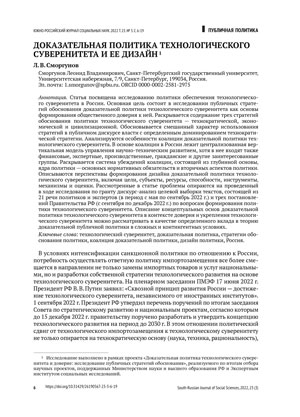Аннотация
Статья посвящена исследованию политики обеспечения технологического суверенитета в России. Основная цель состоит в исследовании публичных стратегий обоснования доказательной политики технологического суверенитета как основы формирования общественного доверия к ней. Раскрывается содержание трех стратегий обоснования политики технологического суверенитета — технократической, экономической и цивилизационной. Обосновывается смешанный характер использования стратегий в публичном дискурсе власти с определенным доминированием технократической стратегии. Анализируются особенности коалиции доказательной политики технологического суверенитета. В основе коалиции в России лежит централизованная вертикальная модель управления научно-техническим развитием, хотя в нее входят также финансовые, экспертные, производственные, гражданские и другие заинтересованные группы. Раскрывается система убеждений коалиции, состоящей из глубинной основы, ядра политики — основных нормативных обязательств и вторичных аспектов политики. Описываются перспективы формирования дизайна доказательной политики технологического суверенитета, включая цели, субъекты, ресурсы, способности, инструменты, механизмы и оценки. Рассмотренные в статье проблемы опираются на проведенный в ходе исследования по гранту дискурс-анализ целевой выборки текстов, состоящей из 21 речи политиков и экспертов (в период с мая по сентябрь 2022 г.) и трех постановлений Правительства РФ (с сентября по декабрь 2022 г.) по вопросам формирования политики технологического суверенитета. Описание концептуальных основ доказательной политики технологического суверенитета в контексте доверия и укрепления технологического суверенитета можно рассматривать в качестве определенного вклада в теорию доказательной публичной политики в сложных и контингентных условиях.
Ключевые слова
Информация о финансировании
Исследование выполнено в рамках проекта «Доказательная политика технологического суверенитета и доверие: исследование публичных стратегий обоснования», реализуемого по итогам отбора научных проектов, поддержанных Министерством науки и высшего образования РФ и Экспертным институтом социальных исследований.
Библиографические ссылки
A European Strategy for Data. European Commission. Brussels (2020). Retrieved from https://eur-lex.europa.eu/legal-content/EN/TXT/PDF/?uri=CELEX:52020DC0066&from=EN
Afanas’ev, A.A. (2022). Tekhnologicheskiy suverenitet kak nauchnaya kategoriya v sisteme sovremennogo znaniya [Technological Sovereignty as a Scientific Category in the Contemporary Knowledge System]. Ekonomika, predprinimatel’stvo i pravo [Journal of Economics, Entrepreneurship and Law], 12(9), 2377–2394. DOI 10.18334/epp.12.9.116243
Amir, S. (2013). The Technological State in Indonesia: The Co-constitution of High Technology and Authoritarian Politics. London and New York: Routledge.
Bassens, D., & Hendrikse, R. (2022). Asserting Europe’s Technological Sovereignty amid American Platform Finance: Countering Financial Sector Dependence on Big Tech? Political Geography, 97, 1026–1048. DOI 10.1016/j.polgeo.2022.102648
Bilotta, N. (2020). Chto stoit za tsifrovym nalogom: vyzovy bor’by Yevropeyskogo soyuza za tekhnologicheskiy suverenitet [Beyond the Digital Tax: The Challenges of the EU’s Scramble for Technological Sovereignty]. Vestnik mezhdunarodnykh organizatsiy [Bulletin of International Organizations], 15(4), 30–47. DOI 10.17323/1996-7845-2020-04-02
Couture, S., & Toupin, S. (2019). What Does the Notion of “Sovereignty” Mean when Referring to the Digital? New Media & Society, 21(10), 2305–2322. DOI 10.1177/1461444819865984
Danilin, I. (2021). Amerikano-kitayskaya tekhnologicheskaya voyna cherez prizmu tekhnonatsionalizma [The U. S.-China Technological War Through the Prism of Techno-Nationalism]. Puti k miru i bezopasnosti [Pathways to Peace and Security], 1(60), 29–43. DOI 10.20542/2307-1494-2021-1-29-43
Dmitriy Chernyshenko: Obespecheniye tekhnologicheskoy nezavisimosti trebuyet novykh kompetentsiy ot upravlentsev v sfere nauki i vysokikh tekhnologiy [Ensuring Technological Independence Requires new Competencies from Managers in the Field of Science and high Technology]. Sayt Pravitel’stva RF [Website of the Government of the Russian Federation]. Retrieved from http://government.ru/news/47232/
Globerman, S. (1978). Canadian Science Policy and Technological Sovereignty. Canadian Public Policy / Analyse de Politiques, 4(1), 34–45.
Gruin, J. (2019). Financializing Authoritarian Capitalism: Chinese Fintech and the Institutional Foundations of Algorithmic Governance. Finance and Society, 5(2), 84–104. DOI 10.2218/finsoc.v5i2.4135
Heclo, H. (1995). Issue Networks and the Executive Establishment. Public Policy Theories, Models, and Concepts. An Anthology / Ed. By McCool D. (pp. 268–287). Englewood Cliffs, N.J.: Prentice Hall.
Kim, S. E., & Urpelainen, J. (2014). Technology Competition and International Co-operation: Friends or Foes? British Journal of Political Science, 44(3), 545–574.
Koptev, Yu. N., Kutakhov, V. P., Rusinov, A. A. (2015). Tekhnologiya realizatsii gosudarstvennoy politiki Rossii po ukrepleniyu oboronosposobnosti, suvereniteta i tekhnologicheskomu razvitiyu promyshlennosti [The Technology of Russia’s State Policy Implementation as for the Defense Potential and Sovereignty Strengthening, and for the Industry Technological Development]. Rossiyskoye predprinimatel’stvo [Russian Journal of EntrepreneurshiP], 16(21), 3649–3658. DOI 10.18334/rp.16.21.2016
Polnogo tekhnologicheskogo suvereniteta dostich’ nevozmozhno, zayavil Gref [Full Technological Sovereignty is Impossible to Achieve, Gref] (2022). RIA Novosti [RIA News]. Retrieved from https://ria.ru/20220907/suverenitet-1815005465.html
Reytingi doveriya politikam, otsenki raboty prezidenta i pravitel’stva, podderzhka politicheskikh partiy [Ratings of Trust in Politicians, Evaluation of the President and the Government, Support for Political Parties] (2022). VTSIOM Novosti [VCIOM News]. Retrieved from https://wciom.ru/analytical-reviews/analiticheskii-obzor/reitingi-doverija-politikam-ocenki-raboty-prezidenta-i-pravitelstva-podderzhka-politicheskikh-partii-20221209
Rohe, S., & Mattes, J. (2022). What about the regional level? Regional configurations of Technological Innovation Systems. Geoforum, 129, 60–73. DOI 10.1016/j.geoforum.2022.01.007
Sá, C., Kretz, A., & Sigurdson, K. (2013). Techno-Nationalism and the Construction of University Technology Transfer. Minerva, 51(4), 443–464.
Sabatier, P., & Jenkins-Smith, H. (1993). Policy Change and Learning: An Advocacy Coalition Approach. Boulder, CO: Westview Press.
Sem’ya, G. V., Stanilevskij, V. V., Gazaryan, A. A., Nekrasov, A. S. (2022). Dokazatel’nyy podkhod v upravlenii: dokazatel’nyy menedzhment i dokazatel’naya politika [Evidence-Based Approach to Governance: Evidence-Based Management and Evidence-Based Policy]. Social’naya psihologiya i obshchestvo [Social Psychology and Society], 13(1), 209–223. DOI 10.17759/sps.2022000001
Shkodinskiy, S. V., Kushnir, A. M., & Prodchenko, I. A. (2022). Vliyaniye sanktsiy na tekhnologicheskiy suverenitet Rossii [The Impact of Sanctions on Russia’s Technological Sovereignty]. Problemy rynochnoy ekonomiki [Problems of the Market Economy], 2, 75–96. DOI 10.33051/2500-2325-2022-2-75-96
Smorgunov, L.V. (Ed.). (2015). Upravleniye publichnoy politikoy: Kollektivnaya monografiya [Governance of Public Policy]. M.: Aspekt-Press.
Solleiroa, J. L., & Castanon, R. (2005). Competitiveness and Innovation Systems: The Challenges for Mexico’s Insertion in the Global Context. Technovation, 25, 1059–1070.
Ukaz Prezidenta Rossiyskoy Federatsii ot 14.04.2022 № 203 “O Mezhvedomstvennoy komissii Soveta Bezopasnosti Rossiyskoy Federatsii po voprosam obespecheniya tekhnologicheskogo suvereniteta gosudarstva v sfere razvitiya kriticheskoy informatsionnoy infrastruktury Rossiyskoy Federatsii” [Presidential Decree of 14.04.2022 № 203 “On the Interagency Commission of the Security Council of the Russian Federation on Ensuring the Technological Sovereignty of the State in the Development of Critical Information Infrastructure of the Russian Federation”]. Retrieved from http://publication.pravo.gov.ru/Document/View/0001202204140035?index=0&rangeSize=1
Wriston, W.B. (1988). Technology and Sovereignty. Foreign Affairs, 67(2), 63–75.


